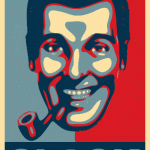 I am at leisure. Specifically—and many may not regard this as leisure—I just ran 17.71 miles in Yosemite Valley. I dropped the car along the road near the 41 junction and then just started running. I went south for a while, then circled back to Bridalveil Falls (lightly flowing), then up to the Glacier Point loop, then back down to El Capitan, then up to Yosemite Falls (not flowing). Lunch was at the Village and then I tracked down the car again.
I am at leisure. Specifically—and many may not regard this as leisure—I just ran 17.71 miles in Yosemite Valley. I dropped the car along the road near the 41 junction and then just started running. I went south for a while, then circled back to Bridalveil Falls (lightly flowing), then up to the Glacier Point loop, then back down to El Capitan, then up to Yosemite Falls (not flowing). Lunch was at the Village and then I tracked down the car again.
Now, then, I am at leisure. The barman has set me up with a martini. I have a Fresno Fig flatbread on the way: goat cheese, bacon, arugula, and the critical figs. I am showered all the way down to between my toes. The late afternoon light is filtering through a mild haze onto the muddy belly of the lake. There must be bass out there somewhere. Let the bass live. Let them be at leisure.
A must-read on this topic is Derek Thompson’s Atlantic article, The Free-Time Paradox in America. I don’t agree with the thesis, though. It’s not really a paradox. It’s just an unknown. You should read Derek’s original, but I will comment briefly on some of his points. He argues that John Maynard Keynes forecast a reduction in work requirements by the 21st Century. Mechanization would take the drudgery out of most things and we would get to 15 hour work weeks with the management of our leisure time an increasing burden on us.
The present didn’t work out that way.
Instead, educated high-earners work ever harder. The only leisure class is the non-college-educated male youth who don’t work much these days but instead play video games (75% of their spare time) and are happier than when more of them worked.… Read the rest